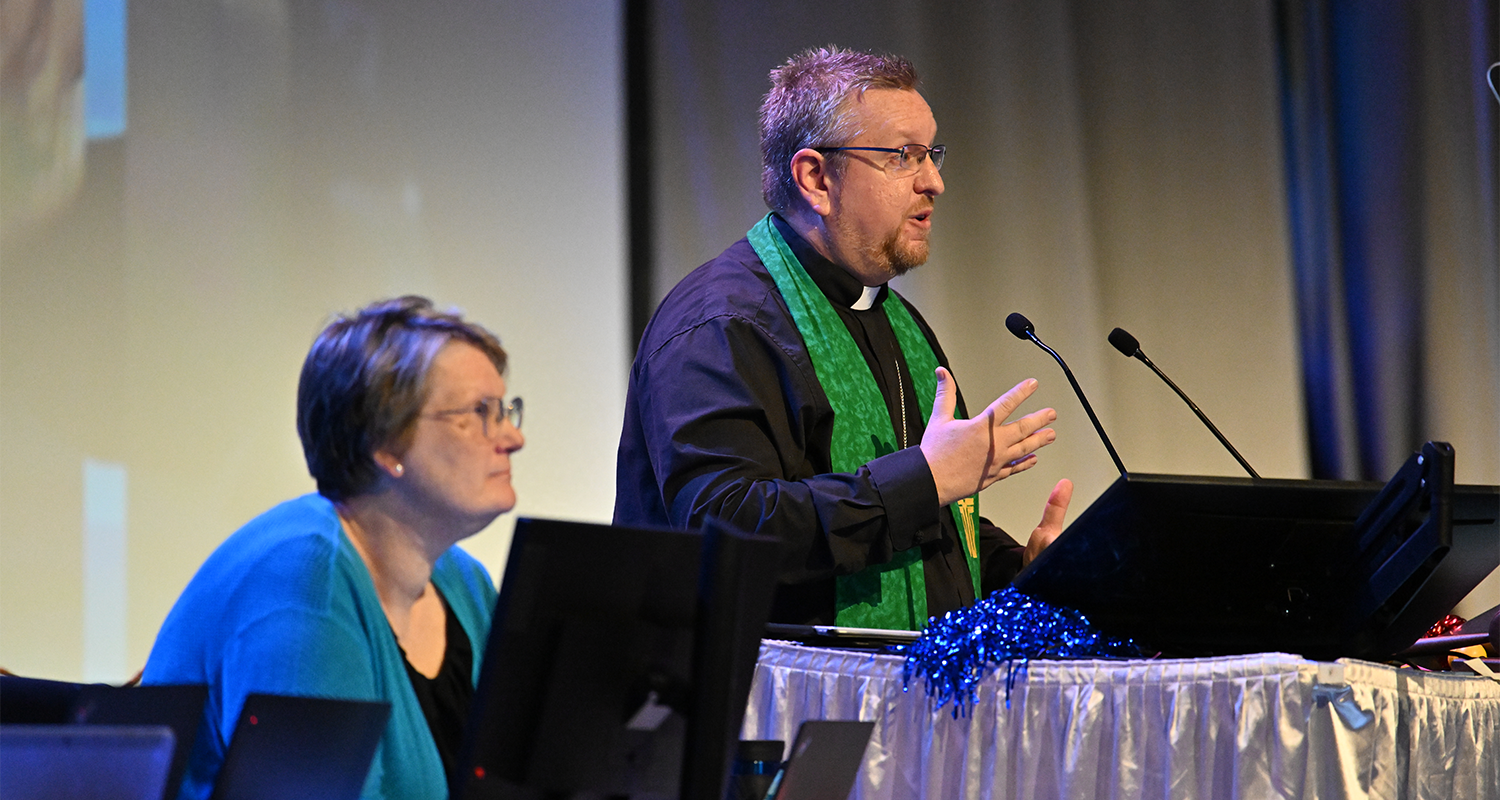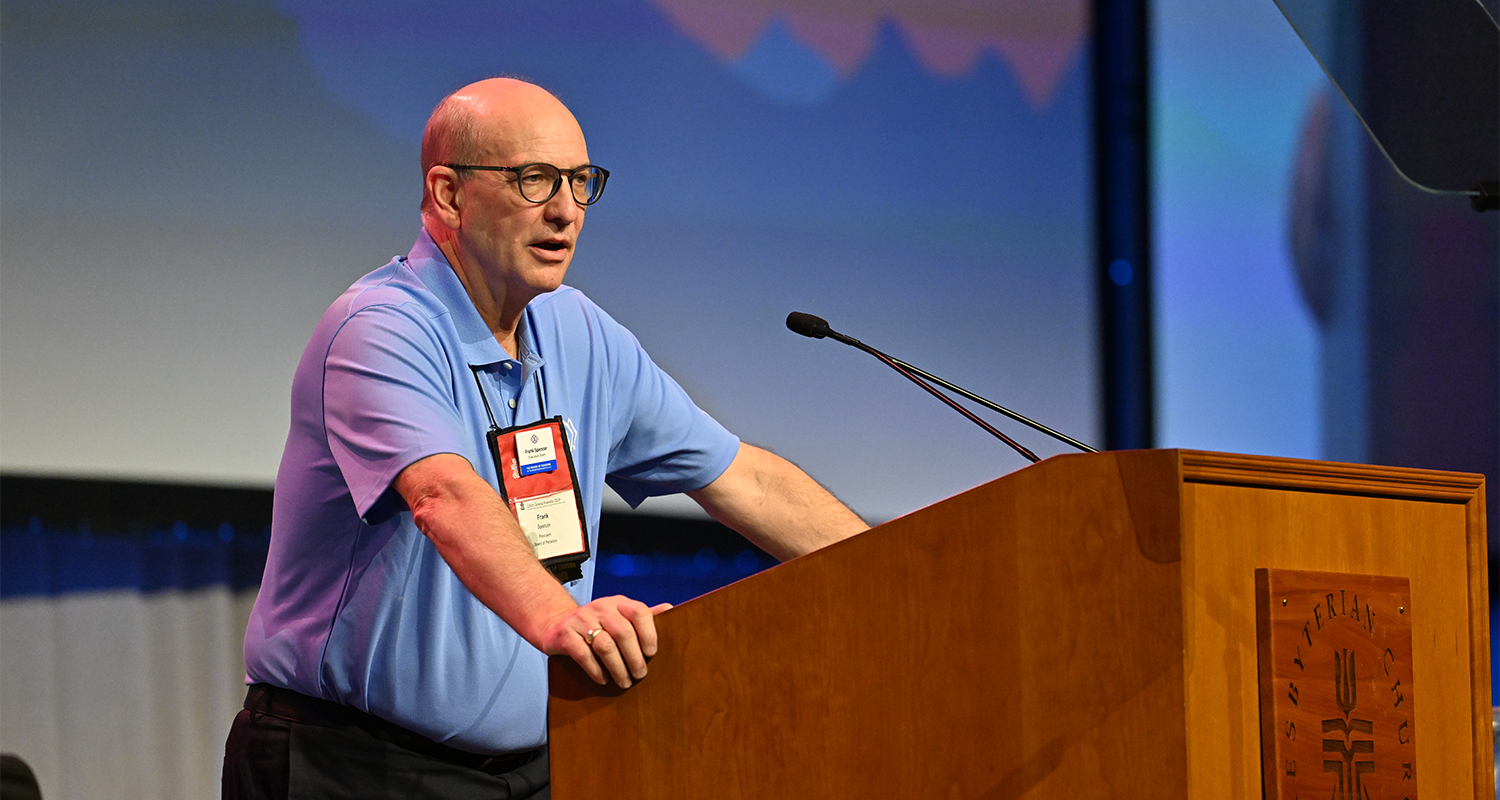
The Rev. CeCe Armstrong, co-moderator of the 226th General Assembly and Commissioner Dustin Wilsor join commissioners and advisory delegates in a dance break during Tuesday night’s plenary at the 226th General Assembly. Photo by Rich Copley
Pausing during a break for a technology fix during the final plenary Tuesday, commissioners and advisory delegates to the 226th General Assembly pulled out the stops and, led by Co-Moderator the Rev. CeCe Armstrong, performed the Electric Slide while they waited. The event was, well, electric, and entertaining. The impromptu dance wasn’t all that the body accomplished.
Commissioners did not complete all their work considering items coming from the General Assembly Entity Committee. But they did approve two of them, GAEC-23 and GAEC-28, as presented Tuesday by committee leaders Franzetta Turner of the Presbytery of the Western Reserve and the Rev. Ralph Clingan of the Presbytery of Utah.
GAEC-23, which came from the General Assembly Committee on Representation, will expand the capacity for economically diverse participation on the PC(USA)’s boards, commissions and committees by using per capita funds to offset the economic impact of participation. The item was inadvertently left off the consent agenda and passed Tuesday by acclamation.
GAEC-28 asks the mid council leaders’ group to select five leaders to work with the Board of Pensions to explore adjustments to be made to medical dues plans for pastors and spouse or families. The work is designed to help alleviate the burden on small congregations and present options for medical coverage for pastoral leaders needing family, spousal or child coverage in 2026 and beyond.
Daniel Voigt, a teaching elder from the Presbytery of the Twin Cities Area, said plan changes announced by the Board of Pensions earlier this year “disproportionately affect pastors who need coverage for their whole families.”
“Health care is expensive,” said the Rev. Dr. Frank Clark Spencer, president of the Board of Pensions. “There is no magic we can offer that changes the fundamental economics of health care in the United States.” That said, Spencer said the Board of Pensions wants “to create transparency, choice and flexibility” with the announced changes.
Less than half the churches in the PC(USA) participate in the Board of Pensions’ dues program, Spencer said. “We urge presbyteries through their committee on ministry and congregations and their ministers to be in conversation.
The item was approved as amended by a vote of 377-32.

The Rev. Bronwen Boswell, Acting Stated Clerk of the General Assembly of the PC(USA) shares closing comments along with the Rev. Tony Larson, Co-Moderator of the 226th General Assembly at the end of the ninth plenary on Tuesday. Photo by Rich Copley

The Rev. Dr. Frank Clark Spencer, president of the Board of Pensions, answers questions regarding adjustments to medical dues plans for pastors and spouse or families. Photo by Rich Copley
International Engagement Committee
Moderator Rochelle Shaw, a ruling elder from the Presbytery of San Francisco, and the Rev. Ruebén Ortiz-Rodríguez from the Presbiterio Del Suroeste, noted all five of the committee’s items of business had already been approved as part of the consent agenda.
Committee leaders highlighted INT-08, a commissioners’ resolution on reaching out in concern for the Presbyterian Reformed Church in Cuba and the people of Cuba.
INT-06 points to two resources — “Why Palestine Matters” by the Israel Palestine Mission Network and “Focus: Palestine” by the World Communion of Reformed Churches — for seeking ways to end Israeli Apartheid.
INT-05 is titled “On Confessing our Complicity in Christian Zionism.” It’s an effort to update and expand the resolution Confronting Christian Zionism approved by the General Assembly in 2004. INT-05 calls for a study document that addresses the expansion of Christian Zionism in the years since the Assembly’s 2004 policy. That announcement drew applause from many of the commissioners and advisory delegates.
Domestic Engagement Committee
Moderator Dustin Wilsor, a ruling elder from Seattle Presbytery, and Vice Moderator the Rev. Jenny Wells of Heartland Presbytery, helped shepherd two items that received Assembly approval.
DOE-09, On Solitary Confinement, urges Presbyterians to call upon their city, state and federal elected officials to enact reforms ending prolonged solitary confinement. It calls upon the 50 states, all U.S. territories and holdings, the District of Columbia and the federal government to follow the three states that have already passed comprehensive legislation significantly reducing the number of people being held in solitary confinement. It also calls upon legislators to prohibit solitary confinement for vulnerable populations, including juveniles, pregnant people, disabled people and LGBTQIA+ persons. The item as amended passed 391-19.
DOE-03, an overture calling for action so that children may live free from gun violence, passed unanimously, 424-0, a vote that commissioners and advisory delegates applauded. The overture calls on every congregation in the PC(USA) to take some specific action of love and responsibility for children as part of the movement to protect children against gun violence.
Assembly attendees heard painful stories from their fellow commissioners on relatives and loved ones who’d been killed by gun violence. Before the vote, Co-Moderator the Rev. Tony Larson prayed to the Prince of Peace, asking “that your presence would be in this room tonight. Great Healer, work your power to heal this wounded nation and all its territories — even, in your mercy, Washington, D.C.”
“Thank you for your prayer, Mr. Moderator,” Wilsor said. “Our committee listened to those stories for an hour.”
